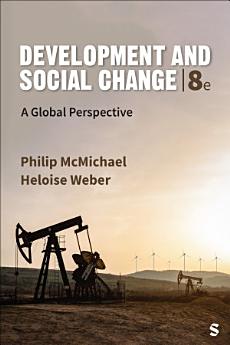Development and Social Change: A Global Perspective, Edition 8
About this ebook
About the author
Philip McMichael grew up in Adelaide, South Australia, completing undergraduate degrees in economics and in political science at the University of Adelaide. After traveling in India, Pakistan, and Afghanistan and doing community work in Papua New Guinea, he pursued his doctorate in sociology at the State University of New York at Binghamton. He has taught at the University of New England (New South Wales), Swarthmore College, and the University of Georgia, and he is presently Emeritus Professor of Global Development at Cornell University, in Ithaca, NY. Other appointments include Visiting Senior Research Scholar in International Development at the University of Oxford (Wolfson College) and Visiting Scholar, School of Political Science and International Relations at the University of Queensland. His book Settlers and the Agrarian Question: Foundations of Capitalism in Colonial Australia (1984) won the Social Science History Association’s Allan Sharlin Memorial Award in 1985. In addition to authoring Food Regimes and Agrarian Questions (2013), McMichael edited The Global Restructuring of Agro-Food Systems (1994), Food and Agrarian Orders in the World Economy (1995), New Directions in the Sociology of Global Development (2005) with Frederick H. Buttel, Contesting Development: Critical Struggles for Social Change (2010), The Politics of Biofuels, Land and Agrarian Change (2011) with Jun Borras and Ian Scoones, and Finance or Food? The Role of Cultures, Values and Ethics in Land Use Negotiations, with Hilde Bjørkhaug and Bruce Muirhead (2020). He has served twice as chair of his department, as director of Cornell University’s International Political Economy Program, as chair of the American Sociological Association’s Political Economy of the World-System Section, as president of the Research Committee on Agriculture and Food for the International Sociological Association. He is also an active member of the International Studies Association. He has also worked with the Food and Agriculture Organization of the United Nations (FAO) and the Civil Society Mechanism of the FAO’s Committee on World Food Security (CFS), the UN Research Institute for Social Development (UNRISD), the international peasant coalition Via Campesina, and the International Planning Committee for Food Sovereignty.
Heloise Weber was born in Colombo, Sri Lanka, where she spent her childhood before growing up and studying in England. She completed her undergraduate degree in International Politics from the University of Wales, Aberystwyth (now Aberystwyth University), and received her doctorate from the University of Southampton. She held a research fellowship and also taught at the University of Warwick and has held tenure track positions at the University of Aberdeen and the University of Sussex. Her current position is in International Relations and Development, at the School of Political Science and International Studies, the University of Queensland. She has been a Visiting Scholar at the Institute of Political Economy/Department of Political Science Carleton University (Canada), Department of Development Sociology, Cornell University, and with the Normative Orders Research Cluster, Goethe University Frankfurt am Main. Her research interests are in the politics of global development and inequality, and critical approaches to international relations. Her publications include Rethinking the Third World: International Development and World Politics (coauthored with Mark T. Berger), and Politics of Development: A Survey (edited). She also coedited a special section of the Review of International Political Economy on the political economy of the GATS/ WTO and development as well as a special issue of Globalizations on Rethinking Development: Beyond Recognition and Redistribution. She has published on the UN’s 2030 Sustainable Development Goals Agenda in the SAIS Review of International Affairs, Globalizations and World Development (the latter coauthored with Martin Weber). Her work engaging international relations includes “Colonialism, Genocide and International Relations: Struggles for Restorative Relations” in the European Journal of International Relations (coauthored with Martin Weber). She is an active member of the Global Development Studies (GDS) Section of the International Studies Association (ISA), and has served twice as GDS program and section chair.







